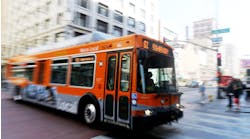Mar. 28—"Don't be a butthead. No smoking on SEPTA."
"That vape smells like a $25 fine. No Vaping on SEPTA."
"Let's keep the train rolling. Not the joints."
Beginning in late 2023, SEPTA riders may have spotted these catchy phrases emblazoned on trains and buses around the region. Now, SEPTA and the city are working on new initiatives to reduce smoking on trains and platforms, an issue that has plagued the agency with increasing intensity in recent years.
"This is a revamp of the previous efforts at combating smoking on our system," said Liz Smith, SEPTA's chief of staff. "We're really approaching it with a new sense of collaboration and a new vigor around really doing whatever we can to reduce smoking on the system."
Smith acknowledges that a previous effort focused on signage alone was "not enough" and says the new partnership with the city will produce a series of initiatives that focus on communication, education and engagement, and enforcement.
Beginning this spring, riders can expect to see enhanced signage and marketing efforts about smoking on all modes of SEPTA transit. The agency will also conduct "smoking blitzes" where SEPTA employees discuss smoking with passengers at stations and provide information on smoking cessation.
The city has contributed $40,000 towards advertising efforts, which SEPTA is planning to match, said Smith, and the group is still figuring out how much more funding is needed for the whole program.
"We're just in the first three months of really getting this off the ground. So we're still working as a team to define all of the initiatives," she said.
Smoking on SEPTA increased during the pandemic
Smoking on SEPTA has increased since the pandemic, said Smith. There were 1,649 reported violations in 2022 up from 502 in 2019, a 228% increase, The Inquirer reported last year.
"Smoking was really not a large issue on our system before COVID," said Smith. "We got very few complaints about people smoking — almost no complaints about people smoking in vehicles, and then a few complaints about people smoking in stations."
Smoking on SEPTA is a public health issue, said Smith, and it's also a barrier to getting more people to ride public transportation. The transit agency has been struggling to rebuild ridership after the pandemic kept people home and off buses and trains.
"When they have that bad experience on the system and they are having to be exposed to smoke during their time on our system, they may not come back," said Smith.
Bringing back riders is increasingly urgent for SEPTA as its federal pandemic aid runs out and the agency faces service cuts and fare hikes. The agency has projected a $240 million deficit this year.
A $25 fine for smoking
People caught smoking on SEPTA can receive an administrative enforcement notice from SEPTA Transit Police, which carries a $25 fine and is also issued for other quality-of-life issues. After receiving four notices in 12 months, a person can be banned from using SEPTA for a year and can be charged with criminal trespassing if they continue to ride transit.
However, increasing enforcement of quality-of-life issues, including smoking, relies on filling job openings for transit police, something SEPTA has been struggling to do.
SEPTA's police force went on strike in November seeking higher wages and has been experiencing staffing shortages. There were around 170 transit patrol and special-unit police officers as of November, 25% below the authorized size.
"We are working as hard as we can to hire police every single day," said Smith.
Riders can alert SEPTA to incidents
Charley Tii, 33, who commutes on the Market- Frankford Line to their job at Drexel University, was wearing a mask on the train on Thursday morning. They have asthma issues and say people smoking on SEPTA makes them feel "disgusted."
"It kind of is a nuisance because even though it's stated not to do so, people do it anyway," they said.
Riders can use the Transit Watch App to share tips with the transit police. Tips can be submitted anonymously, and the app also allows users to include photos or videos.
"It's a very hard problem to get a handle on but we want our riders to know that we hear them," said Smith. "We hear how frustrated they are experiencing smoking on the system ... we're doing everything in our power to try and make that better."
___
(c)2024 The Philadelphia Inquirer
Visit The Philadelphia Inquirer at www.inquirer.com
Distributed by Tribune Content Agency, LLC.

